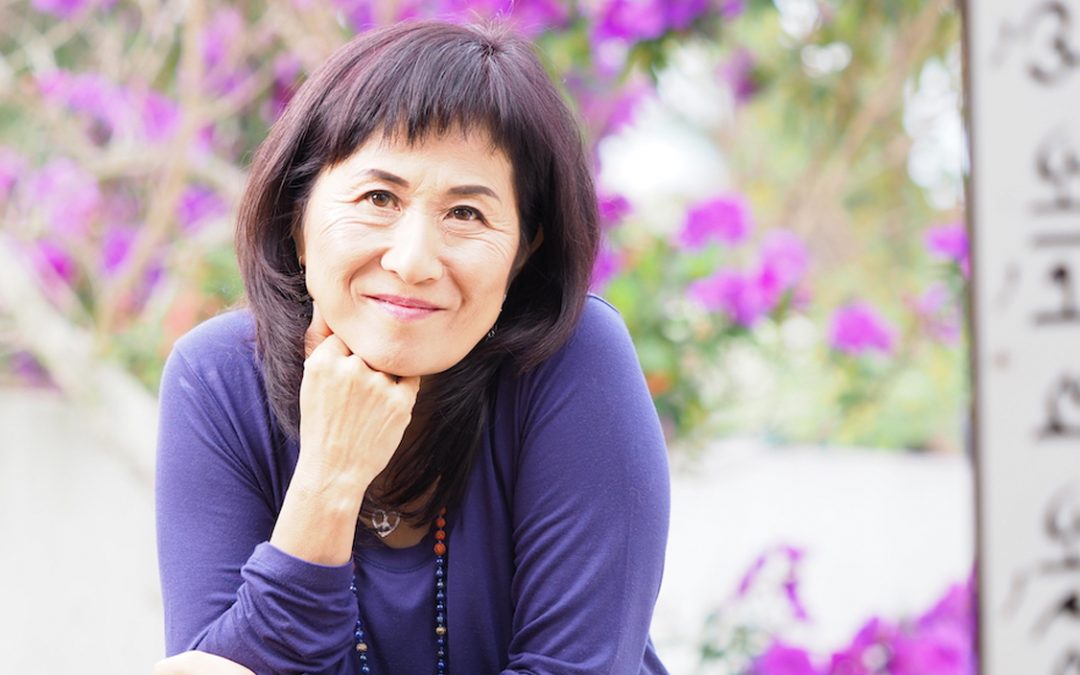This interview originally appeared in The Yoga Lunchbox >>
Ten years ago I had the great pleasure to meet Fuyuko Toyota. We were both assisting our teacher Donna Farhi on a long 21-day training and I was immediately drawn to Fuyuko for her warmth, her humility and humour and her deep, compassionate wisdom.
Over the three weeks, we developed a beautiful appreciation for each others’ teachings, and a delightful friendship which has only deepened through the years. Now we are like brother and sister on the Yoga path!
It has been phenomenal to witness Fuyuko’s journey with the iRest path of meditation over these ten years. For so long it was her deep heart’s desire to bring this transformational practice to Australia, and to New Zealand and recently also to Japan, Hong Kong and further afield in Asia.
Rarely do I meet someone so committed to her path and with such integrity as a Yoga and iRest teacher and trainer. She incorporates iRest and Self-Inquiry in her teachings of Yoga, somatic body awareness and meditation at her Yoga studio, Prema Yoga, on the Gold Coast of Australia.
Briefly, what is iRest?
You can read more about iRest is here >>
But perhaps the iRest website (irest.org) describes it in the best way:
iRest is a meditation practice based on the ancient tradition of Yoga Nidra and adapted to suit the conditions of modern life. When practiced regularly – a little and often – iRest enables you to meet each moment of your life with unshakable peace and wellbeing, no matter how challenging or difficult your situation.
iRest was developed by Dr Richard Miller, a spiritual teacher, author, yogic scholar, researcher and clinical psychologist, who combined traditional yogic practice with Western psychology and neuroscience. It is practiced and taught by thousands of people worldwide in a wide range of settings, including health centres, schools, community centres, yoga studios, correctional facilities and military hospitals.
What makes iRest different from other styles of Yoga Nidra?
These days the iRest organisation prefer to describe iRest as a path of meditation as well as a Yoga Nidra practice. Many traditional forms of Yoga Nidra offer a guided meditation where you are told what to feel, sense, visualise and so on.
iRest instead offers tools to help you inquire into your current, unique experience of feeling and sensing, and to welcome whatever is arising and is present. iRest helps you investigate all that you take yourself to be – body, senses and mind, and then invites you to experience yourself, knowingly as a nondual, unchanging, and wakeful Presence in the midst of the changing circumstances of life.
There are significant further differences between iRest and traditional Yoga Nidra too. For example, while traditional Yoga Nidra does includes the use of a Sankalpa, a powerful vow or resolve, in iRest, Sankalpa is explored as three distinct steps – the Heartfelt Desire, reflecting our heart’s longing and what we deeply wish for our lives – how does life live through you? The Intention for the practice today, and also, uniquely, we cultivate an Inner Resource – a safe haven within your body where you experience a feeling of security, calm and well-being.
Your Inner Resource is individual to you, and ultimately helps you to live with resiliency because whenever one feels overwhelmed by an emotion, thought, or life circumstance, your Inner Resource is available to offer a feeling of security and ease.
There’s more on what makes iRest unique here >>
It was my pleasure to interview Fuyuko in the lead up to an iRest Level 1 Training coming to Auckland, 20 – 25th March 2020.
Neal: Please let us know a little about yourself – your background, how you came to be interested in Yoga and meditation.
Fuyuko: I have grown up in a family of Buddhist background. My great grandfather was a monk. The spiritual way of life was part of our family life. I just I didn’t think anything special about it until I moved to Australia. Also, being young, I was not overtly practising it but it was in me as a basic value system.
I suffered from chronic depression caused by PTSD after I moved from Japan. It was a very challenging time as I was new to Australia and all my family and friends were in Japan. Interestingly, I slowly turned back to spirituality for healing and ease. I travelled to India and discovered Advaita (non-dual) teaching. I found the more I delved into the teachings of Advaita and Buddhism, that they are fundamentally not so different.
I found the same values and views in Yoga. I started to seriously practise Yoga asana, Pranayama and Yoga Nidra as they all helped immensely to improve my chronic depression and trauma-caused challenges. My Yoga teacher Laurene Hassard encouraged and supported me to become a Yoga teacher, although I had never thought of becoming a Yoga teacher. That was begun almost 24 years ago.
Neal: Who are your most important teachers and what are their biggest teachings for us?
Fuyuko: Richard Miller, Donna Farhi and Lauren Hassard. And, I might add LIFE itself is the most important teacher. All taught me greatly, and the most important teaching dear to my heart is: We are not separate Beings so “Love All and Serve All”, “Hurt Never Help Ever” would contain the essence of all their teachings.
Neal: When and how did you become interested in iRest Yoga Nidra Meditation?
Fuyuko: PTSD and depression were still very much a constant companion of my life until Donna Farhi, my Yoga teacher, introduced me to Richard Miller’s iRest Yoga Nidra Meditation in 2006.
After practising it only a little, a profound shift occurred that I could only describe as a fog lifting so that now I can see clearly. Like that song “I can see clearly now”. I was so moved that a strong will (icha) to learn this arose in my heart. I completed iRest Training Level 1 and 2 followed by the certification program and became a certified iRest teacher.
Then, I felt there was so much more to learn and embody this teaching. My study with Richard has continued as I travelled to North America to attend his long retreats twice a year and assisting with his training several times a year. Then, an opportunity arose as I was asked to become a trainer with a specific further study course.
Well, Dharma (Life purpose) has it, I discovered iRest® Meditation and now I share this life-saving & transforming precious teaching in Australasia (New Zealand, Australia, Japan, Indonesia, Hong Kong, as well as other South East Asian countries).
Neal: How have you seen iRest help others?
Fuyuko: I’ve seen iRest help so many, countless numbers of people, in retreats, trainings, workshops, classes and in everyday life.
The iRest Institute has either participated in or drawn from a range of in-depth studies to better understand how meditation—and specifically, iRest—affects our bodies. There have been clinical studies on Workplace Stress, College Life, Homelessness, those in Chemical Dependency, the Elderly, on PTSD and the military, and many more.
It’s fascinating to see how data can confirm what our bodies already know to be true, and to literally see how iRest is helping so many. You can read more about these research projects here.
Neal: How would you describe iRest to someone new to the practice?
Fuyuko: It bears so many gifts in this Pure, Simple and Direct meditation practice.
Pure… in a sense of no fix or change is needed to heal and return to well-being.
Simple… in the sense that everyone can do it and no experience of Yoga or meditation is required.
Direct… in a sense right from the beginning iRest points to and awakens us to who we are: we are already and always wholeness of Pure Being.
It is completely free of imposition or dogmatic approach, it is secular and accessible to all.
I might add, everyone loves it as it allows our body and mind to deeply relax and rejuvenate while learning how to be with difficult emotions and thoughts in life, and to become resilient and well balanced human beings.
Neal: Can you tell us how iRest is connected to and related to Yoga and Tantra?
Fuyuko: iRest incorporates the four foundational philosophies: Samkhya Karika, Patanjali’s Yoga Sutra, Advita/Vedantic, and Kashmiri Saivism’s tantric view. The Map of Meditation from Siva Sutra of Kashmiri Saivism is where iRest’s 10 Steps come out of, and how all of the aforementioned four philosophies are beautifully incorporated to reveal and help realise our True Nature.
I truly feel we are blessed that iRest tools and teachings are made accessible and practical to all, without being dogmatic or philosophical about it.
Neal: Is there anything else you would like to share about iRest?
Fuyuko: As the founder, Richard Miller says “iRest is like the “life’s manual” we wish we got when we were a child”. It is designed to help you meet and greet each moment of your life with a sense of equanimity and balance.
I appreciate Richard Miller for his generous sharing of his understanding and wisdom with all. He is very accessible, warm, and genuine. It is his humanitarian heart that I resonate with and am drawn to. I believe and live the “love all and serve all” principle.
It’s wonderful how we can use the ten-step protocol in various settings, including Yoga environments, physical therapy, massage therapy, social work, clinical and medical establishments, alternative or integrative medical practices, as well as in-job training and job resiliency programs.
Further information and the iRest research information are found on the institute’s website: irest.org
I wish to acknowledge the help of Fuyuko with this interview and also for some of the information from the iRest.org website.

